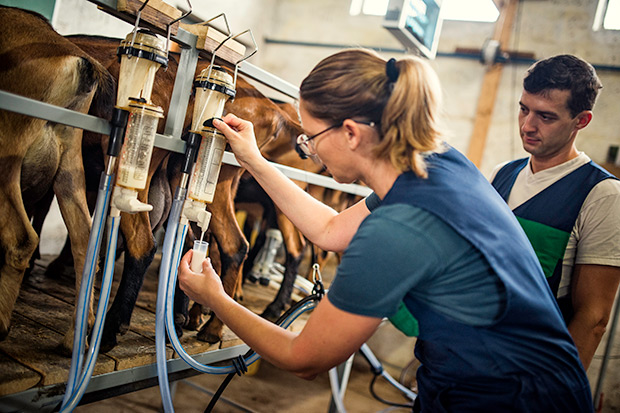Health Care
US Government Will Require More Testing, Tracking Of Bird Flu In Dairy Cows
The US Department of Agriculture announced Wednesday that it is issuing a federal order requiring additional testing and reporting of H5N1 influenza, also known as bird flu, in dairy cows.
The USDA formerly required reporting of H5N1 influenza in poultry and wild birds, but producers were not obligated to notify the government if cows tested positive. This impeded the USDA’s investigation into the present outbreak in cattle. Since instances were discovered in dairy cows in Texas and Kansas in late March, 33 farms in eight states have reported cases.

The new order is part of a slate of measures the government is taking to address H5N1 flu, which has been devastating to bird populations and recently began to infect an increasing number of mammals, potentially bringing it a step closer to being able to spread efficiently between people.
The USDA said at a multiagency news conference Wednesday that the new order would help it get more information on the growing outbreak.
“There has been a little bit of reluctance for some of the producers to allow us to gather information from their farms,” said Dr. Michael Watson, administrator of the USDA’s Animal and Plant Health Inspection Service or APHIS.
“With the federal order going into place, this is going to really help us address any gaps that might exist.”
The order will require that dairy cattle moving between states be tested for avian flu or any type of influenza A before they can travel. No dairy cattle positive for avian flu may move between states without conditions specified by APHIS, Watson said.
Right now, the order doesn’t apply to cattle raised as beef, but the USDA said that could change as it learns more about how the virus is spreading. Experts currently believe the virus is being spread through infected milk.
Watson said the order also gives the government the authority to go to a facility where cattle have tested positive and follow up with additional testing and investigation if needed.
“Requiring positive test reporting will help USDA better understand the disease, and testing before interstate movement will limit the spread of the virus,” he said.
The tests have to be sent to a lab, and it could take several days to get results, Watson said, but the government is working on developing rapid tests that could give results more quickly on the farm.
The order says the US government will pay for the cost of testing for H5N1 for farms, even if animals don’t have symptoms.
The H5N1 virus spreading in cows has not been shown to spread from person to person, and the US Centers for Disease Control and Prevention says the public health risk is low.Only one person, a farmworker in Texas, has tested positive in connection to the outbreak. The CDC says 22 other people have been tested for the virus, and states are monitoring 44 others who were considered exposed and at risk of infection.
The CDC said it is looking into the possibility of monitoring wastewater for the virus, but many farms are not on municipal systems, and there are questions about whether contamination from birds or other infected wildlife might make the results unusable.
The US Food and Drug Administration said Tuesday that it had picked up traces of genetic material from the virus in milk from grocery store shelves.
The FDA and the CDC have long warned against the dangers of drinking raw or unpasteurized milk because of the possibility that it may carry dangerous germs.
The FDA doesn’t believe that pasteurized dairy products can lead to infections, but it’s running confirmatory tests to make sure.
“We anticipate results from those studies will be made available in the next few days to weeks,” Don Prater, acting director of the FDA’s Center for Food Safety and Applied Nutrition, said during Wednesday’s news conference.
Prater declined to say where the milk that showed traces of the virus had been purchased or how widespread the outbreak might be.
“We don’t have information yet to share, but it will be coming out very shortly,” he said.